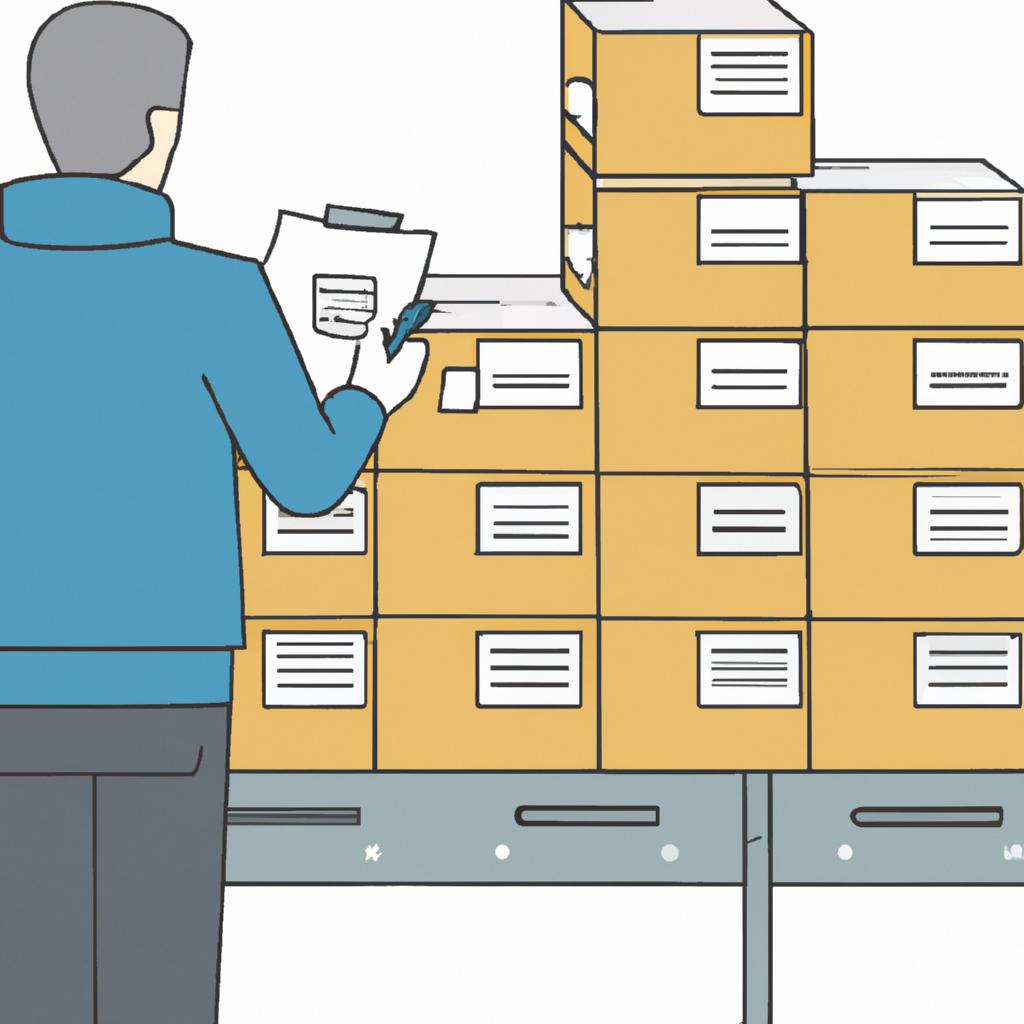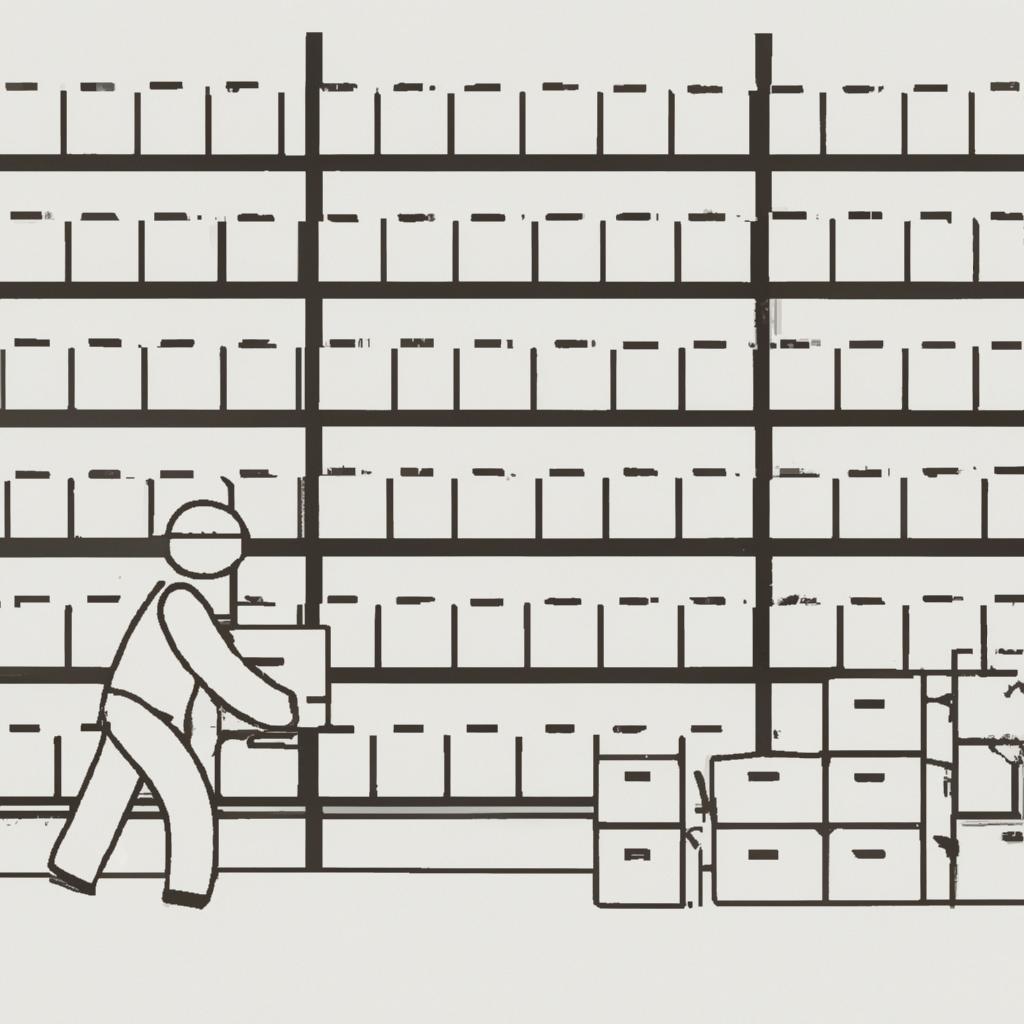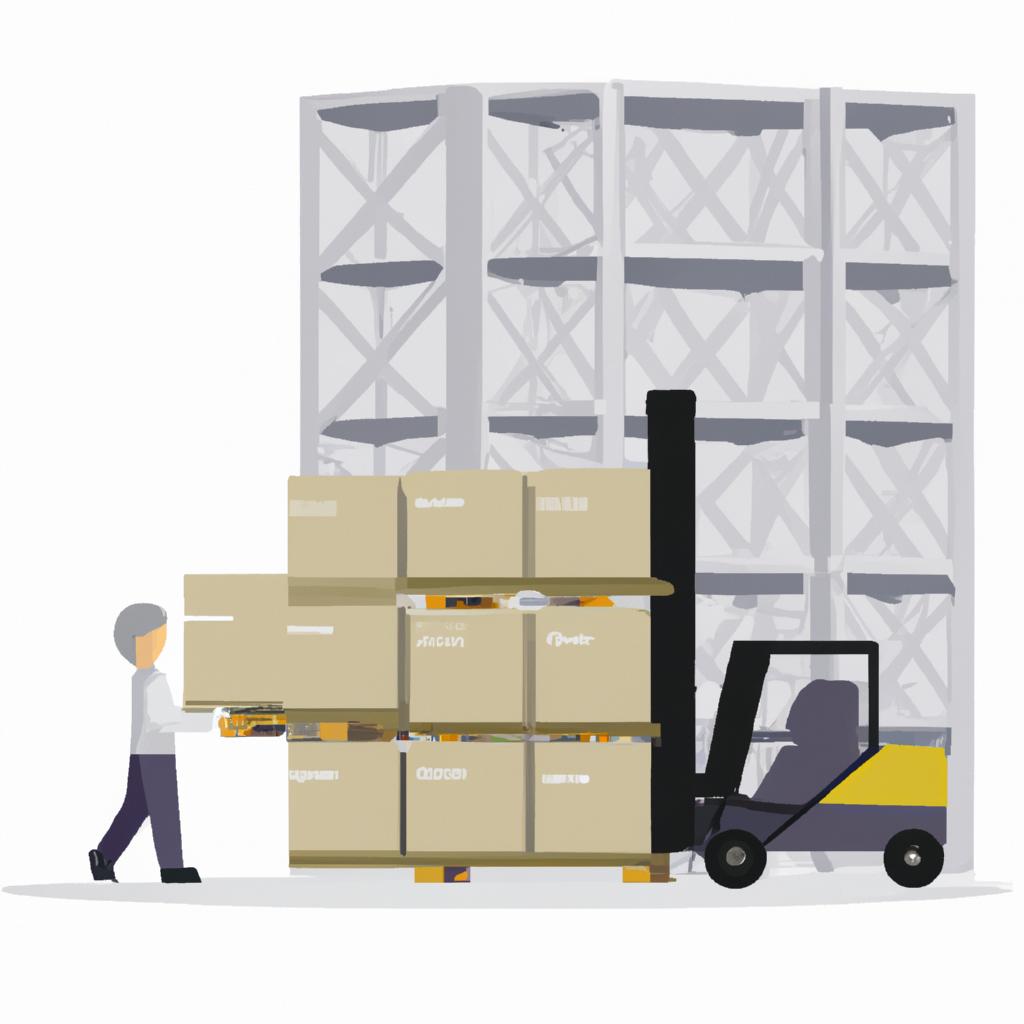Customs Brokerage: Streamlining Transportation and Logistics in Freight Forwarding


In today’s increasingly interconnected global economy, the efficient movement of goods across international borders is vital for businesses to thrive. However, navigating the complex web of customs regulations and procedures can be a daunting task for companies engaged in import and export activities. This is where customs brokerage plays a crucial role by streamlining transportation and logistics in freight forwarding.
For instance, consider a hypothetical case study of Company XYZ, an electronics manufacturer based in Country A that wants to ship its products to retailers located in multiple countries around the world. Without the assistance of a customs broker, Company XYZ would have to dedicate significant time and resources to understand the intricacies of each destination country’s customs requirements. Moreover, they would need to handle documentation, pay duties and taxes accurately, arrange transportation, and ensure compliance with various government agencies’ regulations. The complexity involved in these processes can lead to delays at border crossings and potential financial penalties due to non-compliance.
Customs brokerage acts as a bridge between businesses like Company XYZ and the regulatory authorities responsible for overseeing cross-border trade. By leveraging their expertise in international trade regulations and extensive network of contacts within customs agencies worldwide, customs brokers simplify the shipping process for their clients. They provide comprehensive services such as preparing necessary documents (e.g., commercial invoices , packing lists, and bills of lading), calculating duties and taxes, coordinating with transportation providers, and ensuring compliance with customs regulations.
In the case of Company XYZ, a customs broker would help them navigate the customs requirements of each destination country. They would assist in accurately completing all necessary paperwork, including customs declarations and import/export licenses. The broker would also ensure that the products meet any specific labeling or packaging requirements imposed by the destination countries.
Furthermore, customs brokers have access to electronic systems and databases that streamline communication with customs agencies. This allows for faster processing times and reduces the likelihood of errors or discrepancies in documentation. By having a deep understanding of customs regulations and procedures, they can identify potential issues before they arise and proactively address them to avoid delays or penalties.
In summary, customs brokerage plays a vital role in facilitating international trade by helping businesses navigate complex customs regulations and procedures. Their expertise and network of contacts within customs agencies worldwide allow companies like Company XYZ to focus on their core business operations while ensuring efficient movement of goods across borders.
Role of Customs Brokerage
Role of Customs Brokerage
The role of customs brokerage in the field of freight forwarding is crucial for ensuring efficient transportation and logistics. By acting as intermediaries between importers, exporters, and government authorities, customs brokers play a pivotal role in streamlining international trade processes. To illustrate this, let us consider the case study of Company X, an exporter based in Country A who wishes to ship their goods to Country B.
Firstly, customs brokers assist with the complex documentation required for international shipments. They are responsible for preparing accurate and complete customs declarations, including invoices, packing lists, and other relevant documents. In the case of Company X, a customs broker would gather all necessary information about the goods being exported and ensure compliance with both country A’s export regulations and country B’s import requirements.
Secondly, customs brokers navigate through the intricate web of trade regulations on behalf of their clients. These professionals possess extensive knowledge of customs laws and regulations applicable to different countries or regions. For instance, they can advise Company X on any specific restrictions or tariffs imposed by Country B that might affect the shipment process. This expertise enables customs brokers to guide their clients towards compliant practices while minimizing potential delays or penalties.
Thirdly, engaging a customs broker allows companies like Company X to focus on their core business operations rather than getting entangled in administrative tasks related to international trade. With the increasing complexity of global supply chains, managing customs procedures independently can be time-consuming and resource-intensive. By outsourcing these responsibilities to experienced professionals, businesses can streamline their operations and enhance efficiency.
To emphasize the significance of effective customs brokerage in facilitating smooth trade flows globally, consider the following emotional responses:
- Reduced stress: Companies can rely on experts who will handle all aspects related to shipping procedures.
- Time savings: Businesses can allocate resources more effectively by allowing specialists to take care of custom-related matters.
- Increased profitability: Streamlined processes lead to faster clearance times which ultimately contribute to improved financial performance.
- Enhanced customer satisfaction: Efficient customs brokerage ensures timely delivery, resulting in satisfied customers.
Table 1. Benefits of Customs Brokerage
| Benefit | Description |
|---|---|
| Reduced Delays | Customs brokers expedite the clearance process, minimizing delays. |
| Cost Savings | Effective customs brokerage leads to optimized use of resources. |
| Regulatory Compliance | Professionals ensure adherence to complex trade regulations. |
| Risk Management | Customs brokers mitigate risks associated with international trade. |
In summary, customs brokerage plays a vital role in streamlining transportation and logistics in freight forwarding by assisting with documentation, navigating through trade regulations, and allowing businesses to focus on core operations. The next section will delve further into the specific benefits that customs brokerage brings to the table for companies involved in international trade.
Benefits of Customs Brokerage
Streamlining Transportation and Logistics: The Role of Customs Brokerage
Imagine a scenario where a company is importing goods from overseas. Without the help of customs brokerage, navigating through the complex web of international regulations and requirements can be overwhelming. Let us explore how customs brokerage plays a crucial role in ensuring smooth transportation and logistics in freight forwarding.
Firstly, one key aspect that makes customs brokerage indispensable is its expertise in compliance. A highly skilled customs broker possesses an in-depth understanding of local laws, regulations, and trade agreements. For instance, consider a case study involving Company X, which imports electronic components from Asia to North America. By partnering with a reputable customs broker who has knowledge of both regions’ specific import regulations, Company X can avoid costly delays or penalties due to non-compliance issues.
Moreover, customs brokers actively coordinate with various stakeholders involved in the supply chain process. This includes collaborating with shipping lines, trucking companies, airlines, and government agencies. Through their extensive network and industry connections, they ensure efficient coordination between all parties involved. As a result, shipments are processed smoothly without unnecessary delays or bottlenecks.
The benefits of utilizing customs brokerage extend beyond just compliance and coordination. Here are some advantages it offers:
- Time-saving: Customs brokers handle time-consuming tasks such as paperwork preparation, document submission, and communication with authorities on behalf of their clients.
- Cost-effective: By optimizing import/export processes and identifying potential cost-saving opportunities like duty drawbacks or preferential tariff programs, customs brokers contribute to reducing overall expenses.
- Risk mitigation: With their knowledge of risk assessment techniques and experience in handling different types of cargo, customs brokers assist in minimizing risks associated with regulatory violations or unexpected events during transit.
- Enhanced customer service: Efficient clearance procedures facilitated by customs brokers enable faster delivery times for imported goods. This leads to improved customer satisfaction levels.
To better visualize the significance of customs brokerage services within the transportation and logistics landscape, let us take a look at the following table:
| Customs Brokerage Services | Benefits |
|---|---|
| Compliance assistance | Ensures adherence to import/export regulations and avoids penalties. |
| Documentation management | Streamlines paperwork, reducing administrative burden for businesses. |
| Tariff analysis | Identifies cost-saving opportunities through tariff classification optimization. |
| Risk assessment | Mitigates potential risks associated with regulatory compliance or unforeseen events during transit. |
In conclusion, customs brokerage plays an integral role in streamlining transportation and logistics in freight forwarding by providing expertise in compliance, facilitating coordination among stakeholders, and offering various benefits such as time savings and risk mitigation. In the next section, we will delve into the importance of proper documentation in ensuring seamless international trade operations.
Importance of Proper Documentation
Streamlining Transportation and Logistics: Importance of Proper Documentation
Imagine a scenario where a shipment of electronic goods is being transported from China to the United States. Without proper documentation, this process can become extremely arduous and time-consuming. However, by employing customs brokerage services, companies can ensure that their shipments are handled efficiently and smoothly. In this section, we will explore the importance of proper documentation in customs brokerage and how it contributes to streamlining transportation and logistics.
One key aspect of customs brokerage is ensuring that all necessary paperwork is completed accurately and submitted on time. For instance, when importing goods into a country, various documents such as commercial invoices, packing lists, bills of lading, and certificates of origin need to be prepared. These documents provide crucial information about the nature, value, and origin of the goods being imported or exported. By having these documents readily available and properly filled out, customs clearance processes can occur swiftly without any delays or complications.
The significance of proper documentation becomes even more apparent when considering potential risks associated with international trade. Customs authorities have strict regulations in place to prevent illegal activities such as smuggling or counterfeit goods entering the market. Failing to comply with these regulations can lead to severe penalties or even legal consequences for businesses involved in international trade. Through meticulous attention to detail in document preparation, customs brokers help mitigate these risks by ensuring compliance with relevant laws and regulations.
To further emphasize the importance of proper documentation in customs brokerage, let’s examine some benefits it brings:
- Efficient processing: Accurate documentation enables faster processing times at ports or airports since custom officials can easily verify information without requiring additional clarification.
- Reduced costs: Properly documented shipments reduce the risk of inspections or examinations by custom authorities due to discrepancies or missing information. This ultimately leads to cost savings by avoiding storage fees or demurrage charges.
- Enhanced transparency: Clear and complete documentation allows for better visibility throughout the supply chain. It helps track the movement of goods, identify potential bottlenecks or delays, and enables effective communication between all parties involved.
- Improved customer satisfaction: By ensuring timely delivery with minimal disruptions caused by customs clearance issues, businesses can enhance their reputation and provide a better customer experience.
To illustrate the impact of proper documentation in customs brokerage, consider the following table:
| Scenario | Documentation Quality | Customs Clearance Time |
|---|---|---|
| Shipment A | Incomplete | 5 days |
| Shipment B | Accurate and complete | 2 days |
As seen in this hypothetical example, shipment B with accurate and complete documentation experiences significantly quicker customs clearance compared to shipment A. This highlights how meticulous attention to detail in document preparation contributes to streamlining transportation and logistics processes.
In the next section, we will delve into the customs clearance process itself and explore its various steps. Understanding these steps is crucial for companies seeking to optimize their international trade operations while complying with regulatory requirements.
Customs Clearance Process
Streamlining transportation and logistics in freight forwarding is crucial for efficient and cost-effective international trade. Proper documentation plays a vital role in this process, ensuring smooth customs clearance and minimizing delays or penalties. By understanding the importance of proper documentation, businesses can navigate through complex regulations and facilitate seamless importation and exportation of goods.
Consider a hypothetical scenario where Company XYZ intends to import electronic components from overseas suppliers. Without accurate and complete documentation, such as commercial invoices, packing lists, bill of lading, and certificates of origin, Company XYZ may encounter significant obstacles during customs clearance. For instance, insufficient information on the value or description of the imported goods could result in valuation disputes with customs authorities, leading to delays or even seizure of the shipment.
To emphasize the significance of proper documentation further, let us explore four key reasons why it is indispensable in the customs brokerage process:
- Compliance: Accurate documentation ensures compliance with various legal requirements imposed by local authorities and international trade agreements.
- Risk Management: Documentation provides proof of ownership and assists in managing risks associated with cargo damage or loss during transit.
- Customs Clearance Facilitation: Complete paperwork expedites the customs clearance process by enabling authorities to assess duties accurately while reducing inspection time.
- Record-Keeping: Well-maintained records serve as evidence for financial audits, regulatory inspections, and tax purposes.
Table 1 illustrates different types of documents commonly required for customs clearance:
| Type of Document | Description |
|---|---|
| Commercial Invoice | Provides details about product quantity, |
| price per unit, total value | |
| Packing List | Lists all items included in each package |
| Bill of Lading | Serves as proof of transport contract |
| Certificates of Origin | Verifies country where goods originated |
In conclusion, without proper documentation, companies face numerous challenges when engaging in international trade. The hypothetical case study of Company XYZ demonstrates how crucial accurate paperwork is for smooth customs clearance and uninterrupted logistics operations. By understanding the importance of proper documentation, businesses can ensure compliance with regulations, manage risks effectively, expedite customs processes, and maintain comprehensive records.
Moving forward to the next section on customs compliance and regulations, it is essential to explore how companies navigate through complex legal frameworks to meet their obligations while maximizing operational efficiency.
Customs Compliance and Regulations
Customs Clearance Process is a critical aspect of customs brokerage that ensures the smooth movement of goods across international borders. In this section, we will explore the various stages involved in the customs clearance process and understand how it contributes to streamlining transportation and logistics in freight forwarding.
To illustrate the importance of an efficient customs clearance process, let’s consider a hypothetical scenario. Imagine a multinational corporation based in the United States that needs to import raw materials from China for its manufacturing operations. Without proper customs clearance, delays at border checkpoints could result in significant disruptions to their supply chain, leading to production delays and increased costs. By having a streamlined customs clearance process in place, businesses can minimize these risks and ensure timely delivery of goods.
The customs clearance process typically involves several key steps:
-
Documentation: Importers are required to submit relevant documentation such as commercial invoices, packing lists, bill of lading/airway bills, and certificates of origin. These documents provide crucial information about the shipment and help authorities assess compliance with trade regulations.
-
Customs Declaration: Once the necessary documents are submitted, importers must file a customs declaration providing detailed information about the nature of the goods being imported, their value, quantity, country of origin, and other relevant details. This declaration allows customs authorities to determine applicable duties and taxes.
-
Duty Calculation: Based on the information provided in the customs declaration, authorities calculate applicable duties and taxes owed by importers. Tariffs may vary depending on factors such as product classification, country-specific trade agreements or restrictions, and any preferential treatment granted under free trade agreements.
-
Inspection and Release: After duty calculation is completed satisfactorily by importers (or their appointed custom brokers), shipments may be subject to physical inspection by customs officials to verify compliance with regulatory requirements. Once inspections are cleared or resolved satisfactorily through discussions between parties involved if discrepancies arise during examination release orders are issued allowing shipments into domestic territory.
Bullet Point List:
- Streamlined customs clearance process reduces delays and ensures timely delivery of goods.
- Efficient documentation management minimizes the risk of compliance issues.
- Accurate duty calculation helps businesses plan their costs effectively.
- Effective communication between importers, customs officials, and custom brokers enhances transparency and reduces potential disputes.
Table:
| Benefits of a Streamlined Customs Clearance Process |
|---|
| 1. Faster order processing time |
| 2. Reduced risk of penalties or fines |
| 3. Enhanced visibility and tracking capabilities |
| 4. Improved customer satisfaction |
In summary, an efficient customs clearance process is crucial for streamlining transportation and logistics in freight forwarding. By adhering to regulatory requirements, maintaining accurate documentation, calculating duties correctly, and ensuring smooth inspections and releases, businesses can avoid unnecessary disruptions in their supply chain operations and maintain customer satisfaction.
Transition Sentence: Moving forward, let’s explore the role of technology solutions in optimizing the customs brokerage process.
Technology Solutions for Customs Brokerage
Title: Customs Brokerage: Streamlining Transportation and Logistics in Freight Forwarding
Previous section H2: Customs Compliance and Regulations
Next section H2: Technology Solutions for Customs Brokerage
Transition from the previous section:
Having explored the intricacies of customs compliance and regulations, it is clear that a streamlined approach to customs brokerage is essential for efficient transportation and logistics in freight forwarding. With advancements in technology, innovative solutions have emerged to further enhance this process.
Section: Technology Solutions for Customs Brokerage
To illustrate the benefits of technology in customs brokerage, let us consider an example of a multinational corporation involved in importing electronic goods. Traditionally, this company would face challenges such as delays caused by manual paperwork processing at various checkpoints along the supply chain. However, by implementing advanced software systems specifically designed for customs clearance, they were able to automate document submission and streamline the entire process. This resulted in significantly reduced transit times and improved overall operational efficiency.
The integration of technology into customs brokerage brings forth numerous advantages that simplify operations and optimize resource allocation. Some key benefits include:
- Enhanced accuracy: Automated data entry reduces errors associated with manual input, minimizing costly mistakes that may lead to shipment delays or penalties.
- Improved visibility: Real-time tracking systems allow stakeholders to monitor their shipments’ progress throughout the journey, providing transparency and peace of mind.
- Time-saving capabilities: Electronic filing systems eliminate the need for physical documentation exchange, expediting processes at ports of entry while facilitating faster border crossings.
- Regulatory compliance facilitation: Tech-driven platforms enable businesses to stay up-to-date with evolving regulatory requirements through automatic updates and alerts.
Table highlighting the impact of technology on customs brokerage:
| Benefits | Impact |
|---|---|
| Enhanced Accuracy | Minimized errors; reduced delays |
| Improved Visibility | Transparency; real-time monitoring |
| Time-Saving Capabilities | Expedited processes; faster border crossings |
| Regulatory Compliance Facilitation | Stay up-to-date; avoid penalties |
Incorporating technology solutions not only streamlines customs brokerage but also enhances the overall experience for businesses engaged in freight forwarding. By leveraging these innovations, companies can reduce costs, improve customer satisfaction, and gain a competitive edge in today’s global market.
In summary, technology offers tremendous potential to revolutionize customs brokerage practices. The example of our multinational corporation highlights how automation and digitalization can significantly enhance efficiency and effectiveness within this domain. Embracing technological advancements empowers businesses to navigate complex compliance requirements while optimizing their transportation and logistics processes. Through enhanced accuracy, improved visibility, time-saving capabilities, and regulatory compliance facilitation, customs brokerage becomes increasingly efficient and reliable – ultimately contributing to streamlined operations in freight forwarding without compromising on quality or compliance standards.





